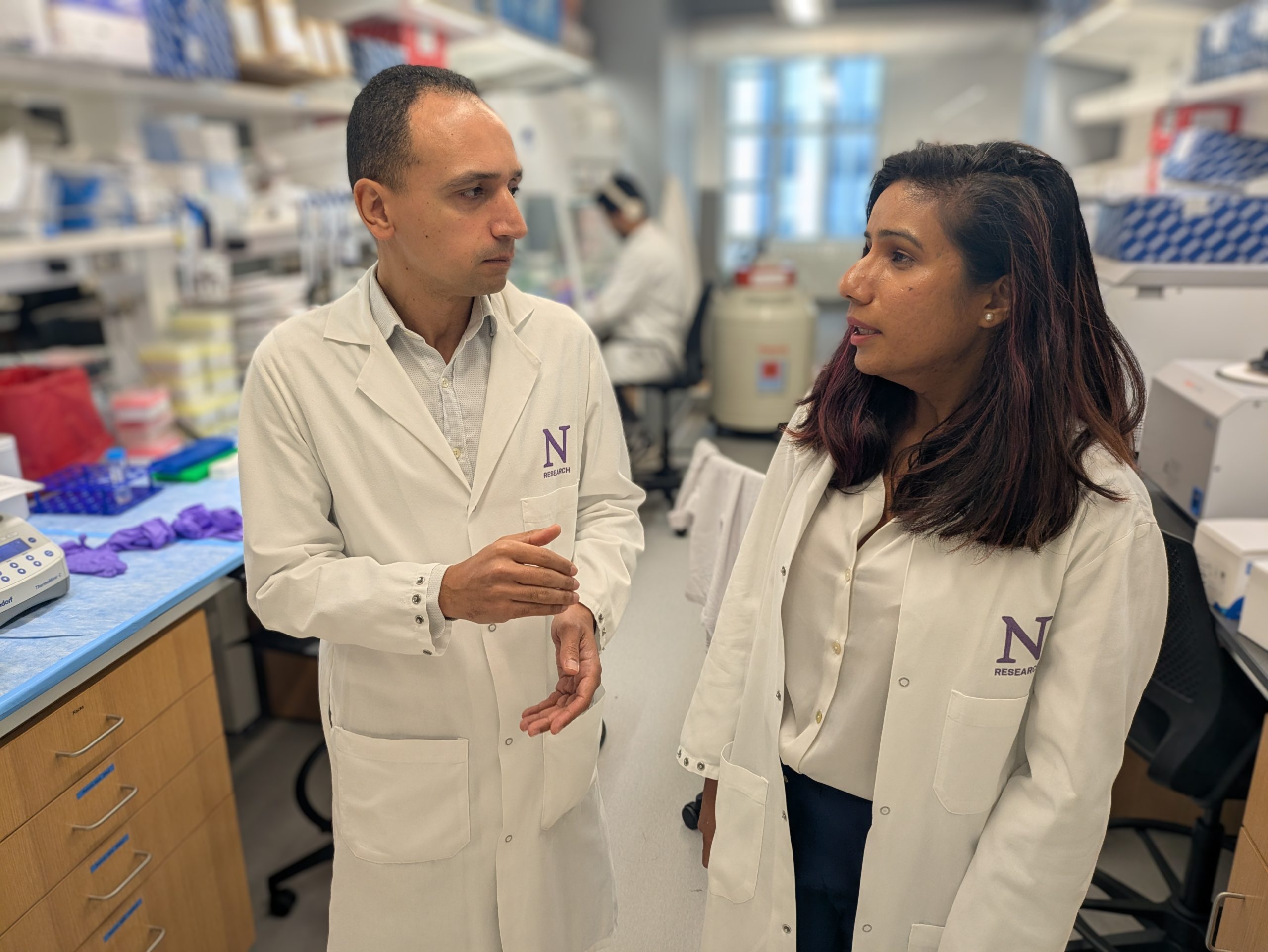Media Coverage
The work done by Northwestern University Feinberg School of Medicine faculty members (and even some students) is regularly highlighted in newspapers, online media outlets and more. Below you’ll find links to articles and videos of Feinberg in the news.
-
Chicago Tribune
–
Sex while pregnant? Get in touch with your body
Dr. Lauren Streicher, associate clinical professor of obstetrics and gynecology at Northwestern University, wants to clear up two myths concerning a pregnancy that is progressing normally: 1) Sex will not cause a miscarriage; and 2) It’s not going to send you into labor. “If there’s already spotting or bleeding, the doctor might tell you to stop having sex to avoid increasing it, but it’s not going to hurt the baby otherwise,” she says. “As far as sex starting labor goes, if you have an orgasm, you do get the uterine contractions, but uterine contractions and labor are not the same thing.”
-
Crain’s Chicago Business
–
Northwestern opens new $399 million Lake Forest Hospital
Situated on a 160-acre campus with pedestrian and bike paths, the new $399 million Northwestern Medicine Lake Forest Hospital opens March 3. The Lake Forest site, acquired in a 2010 deal that included the promise of replacing the aging facility at 1000 N. Westmoreland Road, gives Chicago-based Northwestern Medicine footing on the North Shore. It also provides a new training site for students and doctors from Northwestern University’s Feinberg School of Medicine.
-
The New York Times
–
Two Prostate Cancer Drugs Delay Spread of the Disease by Two Years
The developers of enzalutamide, Pfizer and Astellas Pharma, have applied to the F.D.A. for approval to expand the use of the drug, marketed as Xtandi, to patients in this category, said Dr. Maha Hussain, deputy director of the Robert H. Lurie Comprehensive Cancer Center at Northwestern University’s Feinberg School of Medicine. She co-led that study with Dr. Cora Sternberg, chief of medical oncology at San Camillo and Forlanini Hospitals in Rome.
-
U.S. News & World Report
–
Health Buzz: Sex Doesn’t Have a Direct Impact on Athletic Performance, Research Suggests
Dr. Lauren Streicher, medical director of Northwestern Medicine’s Center for Sexual Medicine and Menopause, was not involved with the research but says that not one study showed an impact on sexual activity and athletic performance unless they didn’t get a good night’s sleep because of it – i.e., if you’re up all night having sex and you go to compete the next day, the lack of sleep is going to matter more. Smoking or alcohol use concurrent with sex could lead to possible negative effects, the study abstract notes. Streicher says that most of the studies involved were not very well done and included small sample sizes, and the study authors say more research is needed for clarity purposes.
-
Reuters
–
Pfizer’s Xtandi delays prostate cancer spread in early stage disease
“The findings from the trial are quite impressive in terms of delaying the visibility of the cancer,” said Dr. Maha Hussain, the study’s lead investigator who will present the data at a cancer meeting in San Francisco later this week. “The data is very likely practice changing,” added Hussain, from the Robert H Lurie Comprehensive Cancer Center of Northwestern University.
-
Chicago Tribune
–
‘Heart sisters’ bond lives on, even after one’s death
Since the first human heart transplant was performed in 1967, the procedure has been offered at major hospitals across the country, with about 2,300 nationwide each year, said Dr. Allen S. Anderson, medical director for Northwestern Memorial Hospital’s Center for Heart Failure, who treated both women. Heart transplants have positive outcomes for patients who would otherwise die from heart failure. About 90 percent of heart transplant patients survive a year after the surgery. And if they survive that first year, those transplant recipients have a 50 percent chance of living another 15 years, Anderson said
-
National Public Radio (Boston)
–
A Living Will For Alzheimer’s
Dr. Darby Morhardt, professor at the Cognitive Neurology and Alzheimer’s Disease Center at Northwestern University’s Feinberg School of Medicine.
-
Reuters
–
Sun safety may not be a top priority in daycare
“The seasonal shift in sun intensity in Illinois means that sun safety receives less attention than health promotion activities that apply all year such as good nutrition, adequate exercise and brushing teeth,” said senior study author Dr. June Robinson of the Northwestern University Feinberg School of Medicine in Chicago. While about half of the daycare programs did provide sunscreen for students, 77 percent of these programs didn’t allow kids to apply the sunscreen themselves, researchers report in JAMA Dermatology.
-
WBEZ Chicago
–
Sex, Drugs, And Singing Ovaries
When Teresa Woodruff started working for a biotech company fresh out of graduate school, she says her employer revealed that the first studies for a new heart attack and stroke treatment had been performed on 50,000 men. […] Woodruff, who’s now an ovarian biology expert with a laboratory named after her at Northwestern Medicine, has since spent much of her career studying fertility and championing equal representation in clinical trials.
-
San Francisco Chronicle
–
Nurses with a mission: Send older ER patients home with help
Emergency rooms have been called the hospital’s front door, so that’s where reformers are starting. “The emergency department is not designed with older adults in mind,” said Dr. Scott Dresden, who heads the Geriatric Emergency Department Innovations program at Northwestern. “You’ve got really thin stretchers. You’ve got patients in the hallway. There’s mechanical noise all around.” Early research at Northwestern and other hospitals shows care from geriatrics-trained nurses in the ER can reduce the chances of a hospital stay after a patient’s emergency visit and for a month afterward.






